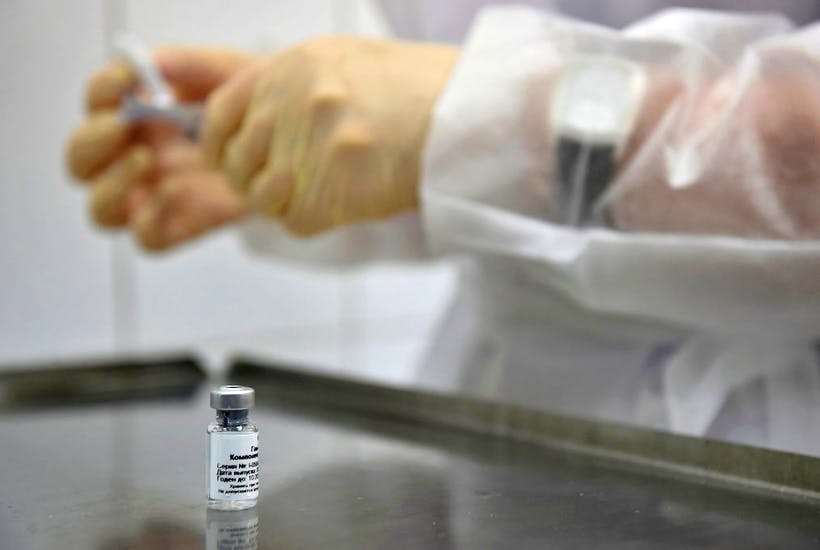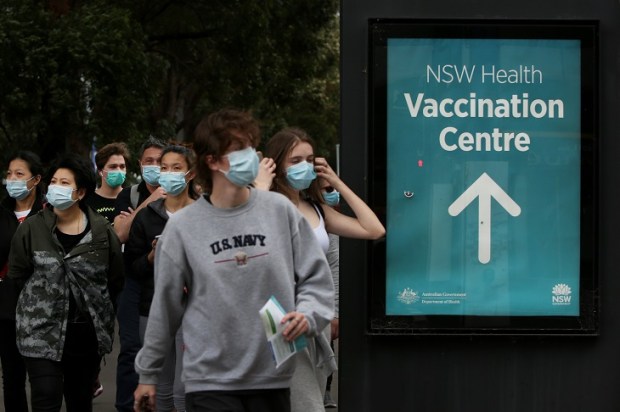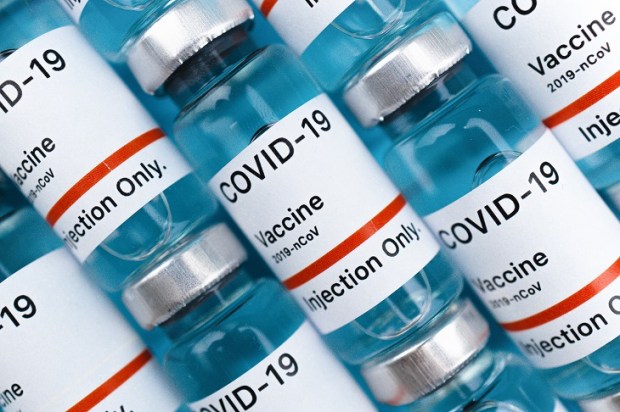On Monday, British Prime Minister Boris Johnson outlined his ‘roadmap’ out of lockdown. An important aspect of this plan is vaccine ‘passports’, even though, as Fraser Nelson wrote on The Spectator’s Coffee House website the next day, Johnson didn’t want to admit to them. He referred to his plans as ‘Covid status certification’.
Such a plan is fraught with several legal and ethical questions, leading to many MPs voicing strong opposition to vaccine ‘passports’. Last weekend a group of 72 MPs signed a pledge against them. This ‘cross-party coalition’ includes Labour leader Sir Keir Starmer, who has stated vaccine ‘passports’ would be against the “British instinct”. Another signatory is Starmer’s predecessor, Jeremy Corbyn. One of the Conservative signatories, Sir Graham Brady, Chairman of the influential 1922 Committee of Tory backbenchers, said: “COVID-status certification would be divisive and discriminatory.” He added: “With high levels of vaccination protecting the vulnerable and making transmission less likely, we should aim to return to normal life, not to put permanent restrictions in place.”
Therein lies the problem. In its editorial on 1 April, entitled: “Governments should proceed with great caution through this minefield”, The British Medical Journal, while broadly supportive of vaccine ‘passports’, had this to say:
The public health principle of least infringement states that to achieve a public health goal, policy makers should implement the option that least impairs individual liberties. While lockdowns may be required, the continued restriction of the civil liberties of those who are immune and pose minimal risk of spreading infection may be unethical, as lack of freedom of movement is one of the most common adverse impacts of the pandemic on people’s lives.
Indeed, as Tony Abbott noted in The Australian on Boxing Day, the National Pandemic Plan’s “ethical framework” includes “ensuring that the rights of the individual are upheld as much as possible” and “that measures taken are proportional to the threat”.
Since we now have an increased understanding of coronavirus, it is evident that it is far less dangerous than the Spanish flu. It has an infection fatality rate of less than 0.1% for people under 70. Therefore, justifications in barring people from working, going about their lawful duties, or enjoying a meal with family and friends, especially if they have no pre-existing conditions, or are not in a vulnerable category, would be difficult to make. Further, there are those who might not be able to have the vaccine for medical reasons. On March 30, The Australian reported that a nurse is suing her former employer for unfair dismissal for refusing to take a flu shot, for medical reasons. How will a decision in this case apply to the coronavirus vaccine? In this regard the British Medical Journal editorial declared:
[E]thical concerns remain about the societal divide that these passports could cause. The Nuffield Council on Bioethics states that such passports could enable coercive and stigmatising workplaces, thereby compounding current structural disadvantages […] Covid-19 vaccines are also contraindicated in some people with serious health conditions and allergies. People facing vaccination access problems will be unable to obtain vaccine passports. Pregnant women are at an increased risk of severe covid-19 illness; however, as clinical trials did not include pregnant women, the uncertain risk of vaccination during pregnancy may also lead to understandable hesitancy in this group.
Opposition to vaccine passports is growing around the globe, such that the World Health Organisation stated on 7 April that people should not be required to prove they have been vaccinated in order to travel overseas, warning that vaccine ‘passports’ would isolate poorer countries. As reported in The Sydney Morning Herald, Dr Mike Ryan, who leads WHO’s public health emergencies program, said it was vital to record that a person had been vaccinated, but said using that information to allow or prohibit a person from taking part in regular life raised complex, ethical issues.
The same paper also reported that Florida’s Republican Governor Ron DeSantis banned the use of vaccine ‘passports’ in his state earlier this month. “It’s completely unacceptable for either the government or the private sector to impose upon you the requirement that you show proof of vaccine to just simply participate in normal society,” DeSantis said. Addressing privacy concerns, government entities are prohibited from issuing documentation about individuals’ COVID-19 vaccine status to a third party.
Florida has recorded 33,673 coronavirus-related deaths in total. On a per capita basis, that is a better result than 26 other states including those that implemented draconian lockdowns such as New York and Michigan.
On March 17 teachers in the Los Angeles School District, the second largest education district in America, filed a suit to prevent the District from mandating the vaccine for its employees. The teachers argue that, since approval by the FDA is for emergency use, it has the status of an experimental vaccine, and thus requires an individual’s informed consent before receiving it. This principle is enshrined in the 1964 Helsinki Declaration, which has been codified at Federal and State level in the USA. Australia has ratified this declaration.
On January 27 the Parliamentary Assembly of the Council of Europe adopted a Resolution entitled: COVID-19 vaccines: ethical, legal and practical considerations. The Resolution cautions that: “Even rapidly deployed, safe and effective vaccines are not an immediate panacea.” Such a statement recalls that of the WHO’s chief scientist, Dr Soumya Swaminathan, regarding coronavirus vaccine efficacy: “I don’t believe we have the evidence on any of the vaccines to be confident that it’s going to prevent people from actually getting the infection and therefore being able to pass it on.” Notably, the Resolution affirms:
- vaccination is NOT mandatory;
- no one must be politically, socially, or otherwise pressured to get themselves vaccinated, if they do not wish to do so;
- no one must be discriminated against for not having been vaccinated, due to possible health risks or not wanting to be vaccinated.
The British Medical Journal editorial also argues that more evidence about the long term effectiveness of different types of vaccines and the duration of protection they confer is required, considering the emergence of new variants. This factor has now taken on even more importance, given that the European Medicines Agency has stated that there is a clear link between the AstraZeneca vaccine and blood clots in the brain. Such an admission may have been due to “Doctors for Covid Ethics”, a group of over 100 doctors and scientists from 25 countries, pressing the EMA on the matter. They highlighted, in particular, a nine-fold increase in clotting following vaccination, compared with its occurrence in the general population, which they tellingly assert is beyond the rate of coincidence (as previously stated by the EMA).
In Australia, Monash University Institute of Pharmaceutical Sciences Professor Colin Pouton, and the President of the Australian Medical Association, Dr Omar Korshid, have cautioned against making any coronavirus vaccine compulsory or tying it to travel.
As reported in The Australian SafeWork Australia tried to have it both ways in a paper released on 19 February. Broadly, the SWA paper indicates that it will be difficult for employers to force employees to take the vaccine, yet adds:
“However, you still might want to require this as a condition of entry to your premises,” while cautioning: “Before you take action to impose this kind of requirement, you should seek advice as there might be privacy and discrimination issues that apply.”
Businesses have raised the possibility of liability if a customer who takes the vaccine in order to access their premises then suffers side effects as a result. The regulatory and financial environment for small businesses especially is already difficult. The enforcement of vaccine ‘passports’ would appear to be another costly bureaucratic impost they could do without.
Additionally, ethical concerns have been raised in relation to certain coronavirus vaccines that have either been derived from the cell lines of an electively aborted foetus (in the case of the government’s vaccine of choice, AstraZeneca), or laboratory testing of them has been conducted utilising such cell lines. The Catholic Archbishop of Sydney, Anthony Fisher, along with the Anglican Archbishop of Sydney, Glenn Davies, and Greek Orthodox Archdiocese of Australia Archbishop Makarios, wrote of such concerns last August. Following this, the Prime Minister declared that, while he would take the coronavirus vaccine, he would be sensitive to people’s ethical concerns. In his words: “[T]hese are personal judgements that people make and you’ve got to always be respectful of other people’s views.”
With regard to vaccine ‘passports’ for travel, NSW Council for Civil Liberties spokesperson Stephen Blanks said last November that the Federal Government would need to ensure that appropriate allowances are made for people who have legitimate reasons for not getting vaccinated. Those reasons could be health, religious or conscientious based. Such reasons would be protected in accordance with articles 18 and 19 of the International Covenant on Civil and Political Rights, which Australia has ratified. Those articles guarantee freedom of speech, conscience and religion.
Therefore, vaccine ‘passports’ would not appear to fulfil the public health principle of least infringement on civil liberties, and thus must not be implemented. Perhaps the last word should be left to Dr Katia Polykova, who wrote to the British Medical Journal on 4 April in response to its position on vaccine ‘passports’.
“I have had more vaccines in my life than most people” Dr Polyakova begins, adding: “I and my entire family have had COVID, as well as most of my friends, relatives and colleagues. I have recently lost a relatively young family member with comorbidities to heart failure, resulting from the pneumonia caused by COVID.” Despite this, she will not have the coronavirus vaccine. In her letter, Dr Polyakova asks “what has happened to scientific and open debate?” Significantly, she cites the vaccine’s experimental status, declaring:
Coercion and mandating medical treatments on our staff, of members of the public especially when treatments are still in the experimental phase, are firmly in the realms of a totalitarian Nazi dystopia and fall far outside of our ethical values as the guardians of health…
I would never debase myself and agree, that we should abandon our liberal principles and the international stance on bodily sovereignty, free informed choice and human rights and support unprecedented coercion of professionals, patients and people to have experimental treatments with limited safety data. This and the policies that go with this are more of a danger to our society than anything else we have faced over the last year.
It does not come any clearer than that.
Dr Rocco Loiacono is a Senior Lecturer at Curtin University Law School.
Got something to add? Join the discussion and comment below.
Get 10 issues for just $10
Subscribe to The Spectator Australia today for the next 10 magazine issues, plus full online access, for just $10.


























Comments
Don't miss out
Join the conversation with other Spectator Australia readers. Subscribe to leave a comment.
SUBSCRIBEAlready a subscriber? Log in